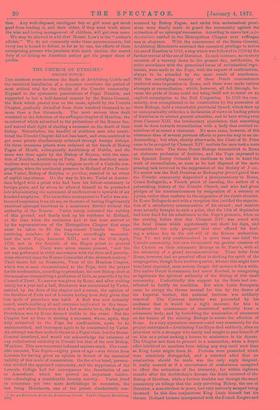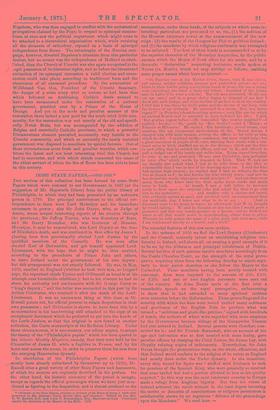THE CHURCH OF UTRECHT.* [SECOND NOTICE.] THE nineteen years between
the death of Archbishop Codde and the canonical installation of a successor constitute the period of most critical trial for the vitality of the Utrecht community. Exposed to the systematic persecutions of Papal Nuncios, and supported in but a half-hearted manner by the States-General, the flock which proved true to the cause, upheld by the Utrecht Chapter, gradually dwindled from three hundred thousand to no more than a few thousands. The most serious blow dealt -consisted in the defection of the suffragan chapter of Haarlem, the members of which submitted to the pretensions of the Roman See, and waived their right of electing a successor on the death of their bishop. Nevertheless, the handful of stubborn men who consti- tuted the Utrecht Chapter did not lose heart, and even contrived to get some priests clandestinely ordained through foreign bishops. On three occasions priests were ordained at the hands of Bishop Fagan of Meath, subsequently Archbishop of Dublin, and the same was done again by the Bishop of Bayeux, with the sanc- tion of Noailles, Archbishop of Paris. But these desultory minis- trations were inadequate to the religious needs of a Catholic con- .gregation, when the accidental presence in Holland of the French- man Varlet, Bishop of Babylon in partibus, resulted in an event ef capital importance. On the way to his see, Varlet at Amster- dam lodged with a priest who had been his fellow-missionary in foreign parts, and by whom he allowed himself to be persuaded into administering the sacrament of confirmation to upwards of six hundred neophytes. The immediate consequence to Varlet was sen- tence of suspension from his see, on the score of having illegitimately exercised episcopal functions in a missionary district without the authority of the Nuncio. Varlet vainly contested the validity of this ground, and finally took up his residence in Holland, at the time when the resolution had at last been arrived at by the representatives of the Metropolitan Chapter that steps must be taken to fill the long-vacant Utrecht See. The surviving members of the Chapter accordingly memorial- ised the new Pope, Innocent XIII., and on the 17th April, 1723, met in the domicile of the Hague priest to proceed to an election. There were seven canons present, "and the act was performed in strict accordance with the rites and prescrip- tions observed since the Worms Concordat of the eleventh century." Their choice fell on Steenoven, Vicar of the Haarlem Chapter, which was at once communicated to the Pope, with the prayer for his confirmation, according to precedent, the new Bishop-elect at the same,time transmitting a profession of faith, as prescribed by the Council of Trent. No answer was given by Rome, and after waiting vainly for a year and a half, Steenoven was consecrated by Varlet, assisted by the dean of the chapter and a canon, the opinion of the faculties of Paris and of Louvain having been duly given that this mode of procedure was valid. A Bull was now instantly issued, anathematising all and everyone implicated in this trans- altion, and when Steenoven died a few months later, the fiuger of Providence was by Rome deemed visible in the event. But the Chapter lost no time in electing a successor, whom, again, they dely submitted to the Pope for confirmation, again to be anathematised, and thereupon again to be consecrated by Varlet. An attempt was then made to thrust in a Papal vicar, but the States- General interfered, and would not acknowledge the existence of any ecclesiastical authority in Utrecht but that of the new Bishop, Wuytiers. This announcement inflamed matters much. The vener- able canonist, Van Espen—eighty years of age —was driven from Louvain for having given an opinion in favour of the canonical validity of this mode of consecration. On the other hand, persecu- tion vivified the oppressed community, and the suppression of the Louvain College had for consequence the foundation of one at Amersfoort, which has proved an important institu- tion —developing a considerable literary activity. Varlet lived to consecrate yet two more Archbishops in succession, the last being Meindaerta, one of the priests clandestinely con-
* Die Alt-Kaeholische Kirehe des Erzbisthurat Utreehl. Von Fr. Nippold, Heidelberg. 1872.
secreted by Bishop Fagan, and under him ecclesiastical provi- sions were finally made to guard the community against the extinction of an episcopal succession. According to canon law, ajus devolutionis resided in the Metropolitan Chapter over suffragan sees in abeyance. With the concurrence of the States-General, Archbishop Meindaerts exercised this canonical privilege to revive the see of Haarlem in 1742, a step which was followed in 1758 by the further revival of the see of Deventer. In each instance, as on every occasion of a vacancy down to the present day, notification, in strict accordance with the prescribed forms of ecclesiastical regu- lations, were made to the Pope, with the request of confirmation, always to be attended by the same result of anathemas. Still the unbudging tenacity of these Dutch remonstranta produced some impression in Rome, and there were made various attempts at reconciliation, which, however, all fell through, be- cause the pride of Rome could not bring itself not to insist on an explicit subscription to the Bull Unigenitus. In 1763 the com- munity, now strengthened in its constitution by the possession of three Bishops, held a remarkable provincial Synod, which drew up so unimpeachably orthodox a declaration of views on leading points of doctrine as to attract general attention, and to have wrung even from Clement XIII. the involuntary ejaculation that something must be done towards reconciliation with a body that evolved re- solutions of so sound a character. No more came, however, of this utterance than of several previous efforts to pave the way to an un- derstanding; but when, shortly afterwards, the Chair of St. Peter came to be occupied by Clement XIV. matters for once took a more favourable turn. The three Dutch Bishops transmitted to Rome an elaborate profession of doctrine, and the Pope expressed to the Spanish Envoy Grimaldi his readiness to take in hand the work of reconciliation, as soon as he had disposed of the more pressing task involved in the suppression of the Society of J-:sus. No sooner was the Bull Dominus ac Redemptor promulgated than the Utrecht community despatched a plenipotentiary to Rome, Count Bellegarde, a French priest of learning, the author of a painstaking history of the Utrecht Church, and who had given pledges of his conscientiousness by resignation of a canonry at Lyons, rather than conform to the exigencies of the Jesuit element. In Rome Bellegarde met with a reception that justified the expecta- tion of a satisfactory consummation of. his errand ; and matters were actually brought to such a point, that the 12th of September had been fixed for his admittance to the Pope's presence, when on the evening before that day Clement XIV. was seized with the fatal illness which mysteriously cut short his days, and extinguished the only prospect' that ever offered for heal- ing a schism due to the self-will of the Roman authorities. Pius VI. not only anathematised in more than one brief the Utrecht community, but even fulminated the greater censures of the Church on their schismatic Bishops in St. Peter's, with all the solemnity of a grand excommunication. These bolts from Rome, however, had no practical effect in shaking the spirit of the congregation, though from another quarter, whence this might have been least expected, most serious danger did menace it for a while. The native Dutch Government had never flinched, in recognising as legitimate the spiritual authority of the Bishop of this small community. Undoubtedly this support by the State had con- tributed to fortify its condition. But when Louis Bonaparte came to occupy the throne created for him by the decree of his Imperial brother, this national buttress was suddenly removed. The Corsican intruder was persuaded by his confessor that it would be a right measure for him to withdraw the countenance of constituted authority from a schismatic body, and by forbidding the nomination of successors on the demise of the existing Bishops to secure the affection of Rome. In a very mysterious manner—and very seasonably for the project entertained—Archbishop Van Rhyn died suddenly, after an interview with a stranger who vainly had sought to pass himself off on him as a priest seeking a licence to ministrate in his diocese. The Chapter met then to proceed to a nomination, when a Royal edict inhibited its members from taking any step until such time as King Louis might deem fit. Protests were presented which were absolutely disregarded, and a renewed edict that no nomination should be made was the only reply deigned. It really seemed as if a concurrence of misfortunes conspired to effect the extinction of the hierarchy, for within eighteen months after the Archbishop's decease the death occurred of the Bishop of Haarlem, while a further shudder ran through the small community on tidings that the only surviving Bishop, the one of Deventer, a man stricken in years, had very narrowly escaped being drowned. In this dire conjuncture King Louis himself lost his throne. Holland became incorporated with the French Empire and
Napoleon, who was then engaged in conflict with the ecclesiastical ' prerogatives claimed by the Pope; in respect to episcopal nomina- tions, at once saw the political importance which might come to be attached to a hierarchical organisation which, while retaining all the elements of orthodoxy, reposed on a basis of episcopal independence from Rome. The catastrophe of the Russian cam- paign, however, diverted Napoleon's attention from this particular matter, but no sooner was the independence of Holland re-estab- "jailed, than the Church of Utrecht was also again recognised in the Aegal possession of its historical rights, and so before the threatened extinction of its episcopal succession a valid election and conse- cration could take place, according to traditional form and the observance of all canonical procedure. By the nomination of Willibrand Van Oos, President of the Utrecht Seminary, the danger of a crisis every whit as serious as had been that which followed on Archbishop Codde's death seemed to have been surmounted under the restoration of a national government, presided over by a Prince of the House of Orange. And yet in the mode and peculiar manner of this restoration there lurked a new peril for the much-tried little com- munity, for the restoration was not merely of the old and specifi- cally Dutch State, but was accompanied by the addition of Belgian and essentially Catholic provinces, in which a powerful Ultramontane element prevailed, necessarily very hostile to the Utrecht community, and which as naturally the newly installed government was disposed to conciliate by special favours. Out of these circumstances arose fresh and peculiar troubles, which con- titute the latest and not least interesting trial this Church has had to encounter, and with which stands connected the name of the ablest servant of whom the See of Rome has been able to boast in this century.











































 Previous page
Previous page